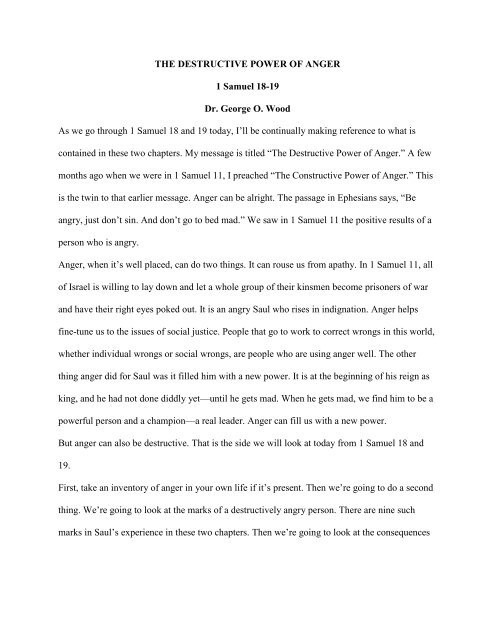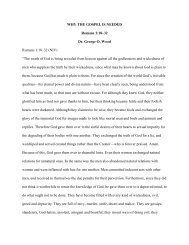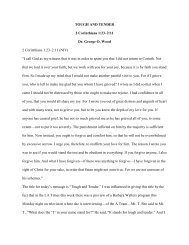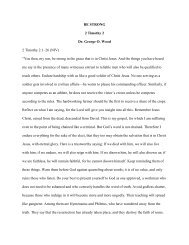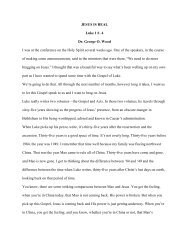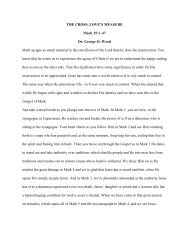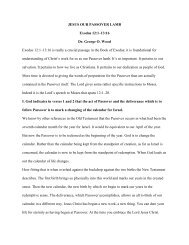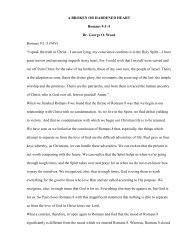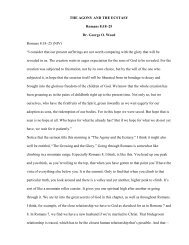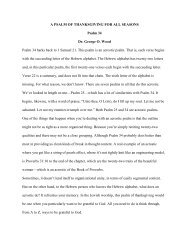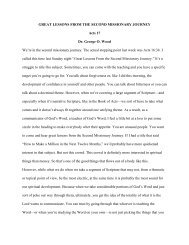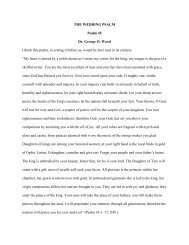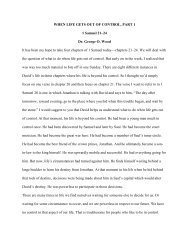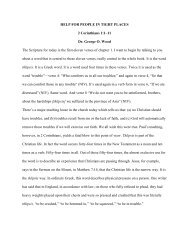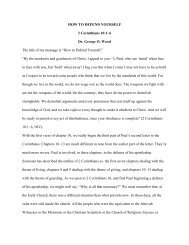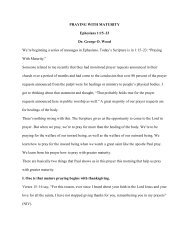THE DESTRUCTIVE POWER OF ANGER 1 Samuel 18-19 Dr ...
THE DESTRUCTIVE POWER OF ANGER 1 Samuel 18-19 Dr ...
THE DESTRUCTIVE POWER OF ANGER 1 Samuel 18-19 Dr ...
You also want an ePaper? Increase the reach of your titles
YUMPU automatically turns print PDFs into web optimized ePapers that Google loves.
<strong>THE</strong> <strong>DESTRUCTIVE</strong> <strong>POWER</strong> <strong>OF</strong> <strong>ANGER</strong><br />
1 <strong>Samuel</strong> <strong>18</strong>-<strong>19</strong><br />
<strong>Dr</strong>. George O. Wood<br />
As we go through 1 <strong>Samuel</strong> <strong>18</strong> and <strong>19</strong> today, I‘ll be continually making reference to what is<br />
contained in these two chapters. My message is titled ―The Destructive Power of Anger.‖ A few<br />
months ago when we were in 1 <strong>Samuel</strong> 11, I preached ―The Constructive Power of Anger.‖ This<br />
is the twin to that earlier message. Anger can be alright. The passage in Ephesians says, ―Be<br />
angry, just don‘t sin. And don‘t go to bed mad.‖ We saw in 1 <strong>Samuel</strong> 11 the positive results of a<br />
person who is angry.<br />
Anger, when it‘s well placed, can do two things. It can rouse us from apathy. In 1 <strong>Samuel</strong> 11, all<br />
of Israel is willing to lay down and let a whole group of their kinsmen become prisoners of war<br />
and have their right eyes poked out. It is an angry Saul who rises in indignation. Anger helps<br />
fine-tune us to the issues of social justice. People that go to work to correct wrongs in this world,<br />
whether individual wrongs or social wrongs, are people who are using anger well. The other<br />
thing anger did for Saul was it filled him with a new power. It is at the beginning of his reign as<br />
king, and he had not done diddly yet—until he gets mad. When he gets mad, we find him to be a<br />
powerful person and a champion—a real leader. Anger can fill us with a new power.<br />
But anger can also be destructive. That is the side we will look at today from 1 <strong>Samuel</strong> <strong>18</strong> and<br />
<strong>19</strong>.<br />
First, take an inventory of anger in your own life if it‘s present. Then we‘re going to do a second<br />
thing. We‘re going to look at the marks of a destructively angry person. There are nine such<br />
marks in Saul‘s experience in these two chapters. Then we‘re going to look at the consequences
<strong>THE</strong> <strong>DESTRUCTIVE</strong> <strong>POWER</strong> <strong>OF</strong> <strong>ANGER</strong><br />
1 <strong>Samuel</strong> <strong>18</strong>-<strong>19</strong><br />
of destructive anger in our lives. There are four of those. Then I want to conclude with some<br />
counsel for the angry—Saul and anyone like him who is destructively angry.<br />
First, a quiz to help you determine whether you need this sermon or if you can check out. Here<br />
are eight questions. Do you have a quick temper? If you have a quick temper, it may suggest a<br />
lot of hostility in your life—sort of like your temper is a bowl of water, and when it‘s bumped it<br />
sloshes out. Second, are you apt to making thoughtless, unfeeling remarks? Like ―You don‘t do<br />
anything right. You‘re nothing but trouble. You‘ll be the death of me yet. You‘re no good.‖<br />
Often the person who makes thoughtless and unfeeling remarks regard it in a different kind of<br />
way. They see it as simply being direct and honest. The only way you can know whether you‘re<br />
direct and honest or whether you‘re thoughtless and unfeeling is to ask the person you‘re making<br />
those remarks to. They‘ll tell you. Third, when you offer a suggestion, are you apt to be more<br />
critical than helpful? Are your suggestions more on the downside than the upside? Do you<br />
simply want to point out where the person has failed rather than help them do right? Sometimes<br />
our suggestions, if they‘re coming from a critical spirit, actually perpetuate the negative behavior<br />
we want them to change. We drive the person‘s resistance to change even deeper. Fourth, are<br />
you inclined to tell people off? Are you always on edge? If somebody cuts you off on the<br />
freeway, are you ready to go at them? We give people a piece of our mind. Not the peace, but a<br />
piece of our mind. Fifth, are you slow to forgive a mistake or overlook a discouragement? Six,<br />
do you have a superior and overbearing attitude toward others? Seven, are you quick to complain<br />
when you‘re inconvenienced or imposed upon? Eight, do you resent it because you‘re not as<br />
well-off as someone else? Well-off can be material, it can be popularity, it can be looks, it can be<br />
money, it can be health—whatever. But, you resent it.<br />
2
<strong>THE</strong> <strong>DESTRUCTIVE</strong> <strong>POWER</strong> <strong>OF</strong> <strong>ANGER</strong><br />
1 <strong>Samuel</strong> <strong>18</strong>-<strong>19</strong><br />
I don‘t even think Saul would have answered ―yes‖ to all of these questions. Dealing with a<br />
person with destructive anger is hard because they do not see themselves. So, just because you<br />
answered ―no‖ to all the questions doesn‘t mean you‘re ok. You may be kidding yourself. But if<br />
you answered ―yes‖ to five or move, then obviously there‘s a high degree of hostility in your life.<br />
You have a tendency to be critical, thoughtless, overly inconsiderate, argumentative, and<br />
unreasonable. Have a hostile reaction to people in general, and you‘ll have very few close<br />
friends—if any. If you answered ―no‖ to all those questions, it may indicate something else. You<br />
may be patient, humane, tolerant, forgiving, and accepting. Or maybe you have let yourself<br />
become a doormat for too many people.<br />
There are really only four things you can do with anger. You can repress it—try to bury it and<br />
don‘t admit you‘re angry. Deny it and ignore it—that‘s like putting a wastebasket of newspapers<br />
in the closet and lighting a match to it. Sooner or later, it‘s going to break out. You can try to<br />
suppress it, and sometimes that‘s called for. We need to cool down before we say what we‘re<br />
thinking—that‘s wisely suppressing anger. But we can‘t do that forever. Or we can express our<br />
anger, and that can be positive. ―I‘m really angry with you.‖ That can be a very good thing to say<br />
to someone. But it also can be expressed very negatively, as Saul illustrates. Or we can confess<br />
anger. That ranges from simply admitting we‘re angry to seeking forgiveness when we‘ve used<br />
anger wrongfully. Probably each of us has a degree of anger in our life. Some of us have more<br />
than others.<br />
I. Let’s look at the destructive marks of anger present in Saul’s experience in chapters <strong>18</strong><br />
and <strong>19</strong>.<br />
There are nine marks.<br />
3
<strong>THE</strong> <strong>DESTRUCTIVE</strong> <strong>POWER</strong> <strong>OF</strong> <strong>ANGER</strong><br />
1 <strong>Samuel</strong> <strong>18</strong>-<strong>19</strong><br />
A. A distorted sense of reality. In 1 <strong>Samuel</strong> <strong>18</strong>:7–8, the women of Israel are singing a new<br />
ballad, ―Saul has slain his thousands, and David his tens of thousands‖ (NIV). That irritates Saul.<br />
It may irritate him, but it‘s true. In resenting the truth, Saul is beginning to distort reality. He is<br />
wishing something not to be true that is true. It‘s like the uselessness of a person saying, ―I am so<br />
mad that two plus two equals four!‖ There is something wrong with a person who gets angry<br />
with a fact.<br />
Has anyone in your family ever said to you, ―You have bad breath today. Do you have some gum<br />
or a mint?‖ or ―Why don‘t you brush your teeth?‖ Do you get angry about that? Why should<br />
you? They know the aroma around you better than you do. Don‘t get mad. Don‘t have a distorted<br />
sense of reality. Accept the reality that is there without raging about it.<br />
For Saul, the fact is, he has sat there for forty days in a row while Goliath has come out to<br />
challenge somebody to fight him. And he has done nothing. David is the one who got up and<br />
fought him. Besides, now Saul has been moved upstairs. He used to be a warrior, but now he‘s<br />
king. And everybody knows that kings have to sit behind a desk because if somebody kills them,<br />
the whole nation collapses. We‘ve got to have the administrator safe. The king doesn‘t go out on<br />
the front lines. Saul is no longer the war hero. David‘s the war hero. David is killing his tens of<br />
thousands, but Saul‘s only killing his few.<br />
Saul is a little bit like a bull running at the red flag. It‘s not the red flag that‘s going to cause the<br />
bull the problems. It‘s the matador. Why not recognize the reality and run after the matador<br />
instead of the flag? But anger gets us chasing the wrong things. Anger distorts our sense of<br />
reality.<br />
B. The second mark of destructive anger is unhealthy suspicion. In verse 8, Saul says, ―What<br />
more can he get but the kingdom?‖ (NIV). We know that David had no designs on Saul‘s throne<br />
4
<strong>THE</strong> <strong>DESTRUCTIVE</strong> <strong>POWER</strong> <strong>OF</strong> <strong>ANGER</strong><br />
1 <strong>Samuel</strong> <strong>18</strong>-<strong>19</strong><br />
at all. Maybe Saul could be forgiven for not knowing that at this particular moment. Let‘s admit<br />
that suspicion can sometimes be a good thing. Suspicion is not an ―all bad‖ trait. It‘s a necessary<br />
preservative, like fear. Fear, in proper proportion, is right. I think you need little bit of fear when<br />
you drive southern California freeways. If you don‘t, there‘s something wrong. And you‘ll get<br />
careless. Fear‘s ok in proportion. Suspicion is ok in proportion. But it becomes unwholesome<br />
when there‘s no objective need or reason for it. That was the case with David. Saul was judging<br />
David‘s motives, and David didn‘t have those terrible motives. Saul is the kind of person who<br />
would say, ―Don‘t confuse me with the facts. My mind is made up. He‘s after my throne and<br />
that‘s the way it‘s going to be.‖ We may get the view that somebody‘s out to get us, or<br />
somebody‘s out to wrong us. That view may be crock. It may be totally off-the-wall and not right<br />
at all. But we die with that false perception. And everybody around us is dying because of our<br />
anger.<br />
C. The third component of Saul‘s destructive anger is jealousy. Verse 9 says he ―kept a jealous<br />
eye on David‖ (NIV). Jealousy can have a healthy proportion too. It can be a good attribute. But<br />
when it‘s extended as in Saul‘s case, it becomes very negative and destructive. The Grinch is a<br />
character in a children‘s book by <strong>Dr</strong>. Seuss. The Grinch cannot bear the sight of anyone enjoying<br />
themselves. He gets so made that he bites himself. That‘s being jealous. It‘s the spirit of ―I will<br />
not be happy if someone else is happy. I will not be happy if someone else has something I don‘t<br />
have.‖ It‘s been said that the person who keeps busy helping the person below him will not have<br />
time to envy the person above him. Saul paid no attention to helping the person below him—<br />
David—because of jealousy.<br />
Preachers can even have it—men and women of the cloth. Two of the great preachers of the<br />
early twentieth century who blessed us with their preaching and with their books are F.B. Meyer<br />
5
<strong>THE</strong> <strong>DESTRUCTIVE</strong> <strong>POWER</strong> <strong>OF</strong> <strong>ANGER</strong><br />
1 <strong>Samuel</strong> <strong>18</strong>-<strong>19</strong><br />
and G. Campbell Morgan. Morgan was a much better orator than Meyer. At one point, they were<br />
pastoring in England within blocks of one another. Meyer confessed to a few of his personal<br />
friends, ―It was easy to pray for the success of Morgan when he was in America. But when he<br />
came back to England and took a church near mine, it was different.‖ Jealousy. We have to deal<br />
with it.<br />
D. The fourth mark of destructive anger is dark moods. In 1 <strong>Samuel</strong> <strong>18</strong>:10, ―An evil spirit from<br />
God came forcefully upon Saul‖ (NIV). Several months ago we looked at what that term meant.<br />
We noted how the Hebrews simply went from the present effect to the ultimate cause. When we<br />
deal with cause and effect relationships biblically, we deal with the intervening causes between<br />
A and B. So we would say today, if we were being theologically accurate, ―God, in His<br />
sovereignty, allowed freedom of choice. He allowed Satan—a good angel—to become a<br />
deceitful angel. He confined him to earth. God also gave people freedom of will. God bound<br />
those angels who fell in rebellion against Him with Satan. People who walk away from God<br />
open their lives to those demonic influences. They may become possessed by them.‖ That‘s how<br />
we would state it. But the Hebrew, looking at the chain of cause and effect, wipes out all the<br />
intervening things. It says, ―The spirit was sent from God.‖ Which, in the ultimate sense, it was.<br />
What the Scripture is really saying is that we pay an awful price for our anger.<br />
If we continue to walk in destructive anger, we may become commingled with spiritual forces<br />
we didn‘t realize we were buying into. Why is it that so much of this country is on street drugs,<br />
prescription drugs for depression, alcohol, and other addictive substances? Why is crack such a<br />
problem in our society? I believe there‘s more than the human element involved. There are<br />
spiritual powers behind these—demonic forces that enslave people and entrap them. Saul,<br />
through his anger and discipline in life, is now walking into dark moods.<br />
6
<strong>THE</strong> <strong>DESTRUCTIVE</strong> <strong>POWER</strong> <strong>OF</strong> <strong>ANGER</strong><br />
1 <strong>Samuel</strong> <strong>18</strong>-<strong>19</strong><br />
A book called ―None of These Diseases‖ is an attempt to take the health codes of the Old<br />
Testament and relate them to their practical implementation of today‘s world—showing how<br />
wise God was in giving those codes to His people. Anyone who travels today to third world<br />
countries immediately recognizes how wise those health codes are.<br />
But in the book, the author tells of a visit by Dale Carnegie to Yellowstone National Park.<br />
Carnegie, with other park visitors, was watching the grizzly bears feed. A guide told them a<br />
grizzly bear could wipe any creature in the west, except the buffalo and the Kodiak bear. They<br />
watched a grizzly bear eat, and they noticed there was only one animal the bear would allow to<br />
eat with him—a skunk. It‘s obvious the bear could have beaten the skunk in any fight. And the<br />
bear probably resented the skunk. But the bear did not attack the skunk. Why? It wasn‘t worth it.<br />
He knew the high cost of getting even.<br />
It‘s a lesson we humans need to learn as well. There is a high cost to getting even.<br />
We may spend long hours, days, and nights dwelling on our resentments—even plotting ways to<br />
strike back. We find the anger begins to get commingled with spiritual forces—forces that are<br />
stronger than our power to break. Was it worth it to be that angry?<br />
E. The fifth mark of destructive anger is out of control actions or out of control responses. See<br />
verses 10–11. Now, for the first time in the text, Saul is acting on his anger. He‘s no longer just<br />
sitting on it. He takes a spear, and he throws it at David—not once, but twice. He‘s overtly acting<br />
on his hostility. He has lost control—like the first wrongfully angry man in the Bible. Saul is<br />
very angry, and his face is downcast.<br />
Times haven‘t changed. Police receive more calls for family conflicts than they do for<br />
aggravated assaults, murders, and all serious crimes put together. A policeman in this church said<br />
that the one call they fear most is breaking up a domestic quarrel. It‘s so unpredictable. Sixty<br />
7
<strong>THE</strong> <strong>DESTRUCTIVE</strong> <strong>POWER</strong> <strong>OF</strong> <strong>ANGER</strong><br />
1 <strong>Samuel</strong> <strong>18</strong>-<strong>19</strong><br />
percent of all homicides in this country are against family members. Twenty-six percent or one<br />
out of every four policemen or policewomen who are killed are handling a family dispute. That‘s<br />
anger out of control—responses out of control.<br />
F. A sixth quality of destructive anger is insecurity. Verse 12 says that Saul was afraid of David.<br />
Fear in this context is simply insecurity. He is threatened. His personal existence and well-being<br />
are threatened. He feels threatened and inferior to David. Anger has brought that insecurity into<br />
his life. Verse 15 repeats the fact that Saul was afraid of him. Verse 29, ―Saul became still more<br />
afraid of him‖ (NIV). Three times in that one chapter it says that Saul was afraid. Unchecked<br />
anger digs away at our sense of worth—our sense of self-esteem. We do not become the whole<br />
person we are capable of becoming when we are angry.<br />
G. Anger, in a destructive sense, will manifest itself in the trait of unreliability. The exceedingly<br />
angry person becomes unreliable. You can‘t count on them to keep their word. That‘s the case in<br />
verses 17–<strong>19</strong>. Saul says to David that his older daughter will be given to him in marriage, but<br />
when the wedding day comes, Saul rips him off. He gives her to somebody else.<br />
H. An eighth quality of destructive anger is impure motives. See verses 20–21. He‘s got a second<br />
daughter, Michal. Why does he want her to be given in marriage to David? That she might be a<br />
snare to him! He says, ―I‘m going to get that guy. He‘s not rich, and he can‘t pay a dowry. I‘ll<br />
get him to kill some Philistines. Bring me a present of one hundred foreskins.‖ Philistines were<br />
uncircumcised people. He‘s dealing with people who didn‘t have the niceties of warfare that we<br />
have today. Saul is trying to get Michal‘s love for David to snare him and cost him his life. What<br />
normal father would do that to his daughter? Take the guy she loves and try to have him killed<br />
before the wedding day? His motives in regard to David and Michal were impure.<br />
8
<strong>THE</strong> <strong>DESTRUCTIVE</strong> <strong>POWER</strong> <strong>OF</strong> <strong>ANGER</strong><br />
1 <strong>Samuel</strong> <strong>18</strong>-<strong>19</strong><br />
I. The ninth quality, seen in verse 22, is speaking untruths. Saul ordered his attendants to speak<br />
to David privately and say, ―The king is pleased with you‖ (NIV). That was opposite of the way<br />
it was. The reason for these untruths is an attempt to destroy David. In fact, in chapters <strong>18</strong> and<br />
<strong>19</strong>, Saul tried to kill David seven times. In <strong>18</strong>:11, he tried to kill him twice by throwing a spear.<br />
In <strong>18</strong>:13, he planned to have him fall into the hands of the Philistines. In <strong>19</strong>:1, he tells his son,<br />
Jonathan, and all the attendants to kill David. Jonathan talks some sense into his dad for a little<br />
bit. In the early part of chapter <strong>19</strong>, Saul cools off. David comes back into his court and is playing<br />
the harp again. But because Saul has never really dealt with his anger, it is only temporarily<br />
submerged. It surfaces again, and we find another attempt on David‘s life. In <strong>19</strong>:10, he tries to<br />
kill him with a spear again. In <strong>19</strong>:11, he sends men to David‘s house to watch it and kill him in<br />
the morning. But Saul‘s daughter, Michal, the new bride of David, protects him. Then in <strong>19</strong>:20,<br />
he sends men to capture David, but David flees to the prophet <strong>Samuel</strong>. Seven times Saul tries to<br />
kill David.<br />
II. What happens as a result of destructive anger?<br />
Think of a person whose anger is out of control. What is following in their wake? What are they<br />
going to reap? From this text there are four things that are going to happen in a destructively<br />
angry person‘s life.<br />
A. They are going to destroy themselves. Destruction of self is number one. Someone has said<br />
that anger is like trying to throw a cactus at someone to hurt them. You may hit them and hurt<br />
them, but in the process you‘ll tear the flesh off your own hands. Most of us find socially<br />
acceptable ways to deal with anger—like repressing it, denying it, or appropriately expressing it.<br />
We may be like the little boy who was told to sit in the corner. He said, ―I may be sitting down<br />
on the outside, but I‘m standing up on the inside.‖<br />
9
<strong>THE</strong> <strong>DESTRUCTIVE</strong> <strong>POWER</strong> <strong>OF</strong> <strong>ANGER</strong><br />
1 <strong>Samuel</strong> <strong>18</strong>-<strong>19</strong><br />
When anger is not being treated honestly and objectively, it‘s channeled into kind of an<br />
emotional reservoir of slush. The slush accumulates and builds up pressure—like methane<br />
underground. Suddenly, it bursts the restraint—losses of temper, outbursts, and harmful actions.<br />
That abusive person may even say on occasion, ―I won‘t do this again,‖ only to find themselves<br />
doing it again. Because destructive anger carries with it self-destruction.<br />
B. Secondly, destructive anger brings devastation within families. Show me a destructively angry<br />
person, and I will show you people in the family who are hurting as a result—a destructively<br />
angry spouse hurting their spouse and hurting their children. Or a destructively angry child<br />
hurting their parents and their siblings. Anger brings destruction within the family. It did with<br />
Saul. He had a wonderful son, Jonathan. He was a great kid. Their relationship was tight at the<br />
beginning, but Saul‘s anger killed that relationship. His anger destroyed his family.<br />
C. A third consequence to destructive anger is the harm caused to the general welfare of the<br />
community. The hidden loss of anger is the loss of the good we could have done—had we spent<br />
our time being productive, rather than being angry. Saul had the responsibility of being king. He<br />
spent so much time being punitively angry with an individual that he slacked off in being king.<br />
He slacked off in his administrative responsibilities. He got so consumed in vengeance that he<br />
nearly plunged his nation into civil war. Everybody suffered in the whole kingdom because Saul<br />
was angry.<br />
That happens in people today, and can even happen in churches. Preachers can get destructively<br />
angry. I‘ve seen some angry preachers—under the guise of being spiritual, but they are simply<br />
being selfish. They‘ve split congregations by preaching texts like ―Don‘t Touch the Lord‘s<br />
Anointed‖ and ―The Door You Walked in Is the Door You Can Walk Out.‖ They won‘t listen to<br />
advice or counsel. Anyone who tries to make a suggestion is somehow a critic or an enemy—<br />
10
<strong>THE</strong> <strong>DESTRUCTIVE</strong> <strong>POWER</strong> <strong>OF</strong> <strong>ANGER</strong><br />
1 <strong>Samuel</strong> <strong>18</strong>-<strong>19</strong><br />
touching God‘s anointed. I‘ve seen that kind of activity wreck whole churches and bodies. All<br />
because someone forgot that we‘re building the Lord‘s kingdom and not our own. Selfish and<br />
destructive anger causes harm to the general welfare of the community. It tears up the work of<br />
God.<br />
D. Then there‘s the loss of relationship to God. That‘s consequence number four. Saul loses it<br />
with God. There‘s an unusual thing happening at the end of chapter <strong>19</strong>. God is still trying to get<br />
through to angry Saul. Saul sends three groups on three occasions to try to capture David when<br />
he‘s with the prophet <strong>Samuel</strong>. But every time a group of people would go to arrest him, they<br />
would fall under the impact of the Holy Spirit, and they would begin to prophesy. They were<br />
helpless to arrest David. Finally, Saul gets fed up. First <strong>Samuel</strong> <strong>19</strong>:23–24, ―So Saul went to<br />
Naioth at Ramah. But the Spirit of God came even upon him, and he walked along prophesying<br />
until he came to Naioth. He stripped off his robes and also prophesied in <strong>Samuel</strong>‘s presence. He<br />
lay that way all that day and night. This is why people say, ‗Is Saul also among the prophets?‘‖<br />
(NIV). What‘s happening? God‘s still trying to get through to Saul. Saul has, what I would call, a<br />
real charismatic experience. He‘s shed some of his clothes, and he‘s lying in a religious state of<br />
ecstasy on the ground. He‘s speaking forth the wonders of God‘s might, His majesty, and His<br />
name. His experience is thoroughly charismatic.<br />
You can have a great experience with God one day, and the next day go out and act like the<br />
devil. That‘s what happened to Saul. He had a wonderful charismatic experience, but within days<br />
it was like it never happened. He was losing it with God. A walk with God depends on far more<br />
than one ecstatic experience. It depends upon getting your conduct in conformity with the<br />
personality of God as revealed in His law and in His Messiah, Jesus.<br />
III. How can we help Saul?<br />
11
<strong>THE</strong> <strong>DESTRUCTIVE</strong> <strong>POWER</strong> <strong>OF</strong> <strong>ANGER</strong><br />
1 <strong>Samuel</strong> <strong>18</strong>-<strong>19</strong><br />
So many times I‘ve read 1 <strong>Samuel</strong> and thought, ―God has a plan for your life, Saul. You don‘t<br />
have to live this way. Here are some things you need to do to change.‖ Maybe Saul wouldn‘t<br />
listen to anybody. That‘s a problem sometimes with a person destructively angry. They‘re not<br />
going to listen to anybody. But maybe if you have destructive anger in your life, you‘ll hear<br />
some of what God is saying to us. And you‘ll see what Saul should have done.<br />
A. First, repent. I know it‘s a hard word. Saul needs to admit, face up to, and repent over his<br />
destructive anger. There‘s not a word in these two chapters that ever suggests he repents. Even in<br />
the few days of respite in 1 <strong>Samuel</strong> <strong>19</strong> when David was back in his court, Saul never said to<br />
David, ―I regret what I tried to do to you.‖ There is no apology or repentance to David, Michal,<br />
or Jonathan. So, it‘s easy for him to get back into the old mold of being destructively angry.<br />
Clear repentance is needed—recognition of ―I need change.‖<br />
B. Second, be honest. Never once does Saul say, for example, ―David, I‘m terribly angry with<br />
you. Please help me. I feel threatened by you. You‘re so good-looking, you‘re so popular, and<br />
you‘re so great at what you do.‖ How would you like to come up against the guy who had all<br />
these qualities—all these things in this magnificent human being? Just face it and say, ―I‘m<br />
jealous of you, David. But I want to overcome this.‖ Or say to Jonathan, ―I wanted you so badly<br />
to be king, but God‘s called David to be king. It doesn‘t seem to bother you. Why should it<br />
bother me?‖ Or say to David, ―David, help me be your father. I‘ll train you in these years on how<br />
to be king, so that when I die, you‘ll be a good king. And Jonathan will be at your right hand.‖<br />
What a different result might have been if Saul would have talked it out! If he would have prayed<br />
about it! If he would have just been honest to someone! But he kept sitting on and nursing his<br />
anger—until all conversation ultimately was lost.<br />
C. Third, he needed to ask for forgiveness.<br />
12
<strong>THE</strong> <strong>DESTRUCTIVE</strong> <strong>POWER</strong> <strong>OF</strong> <strong>ANGER</strong><br />
1 <strong>Samuel</strong> <strong>18</strong>-<strong>19</strong><br />
D. Fourth, in Saul‘s case, he needed to put the Lord on the throne of his life and get his own ego<br />
off the throne. It‘s self who gets frustrated, humiliated, and resentful. Saul feels all those things.<br />
He‘s frustrated because things aren‘t going according to his plan—but then our plan may not be<br />
God‘s plan. He‘s humiliated because others are looking down on him—but what really counts is<br />
what God thinks about us. He‘s resentful because he‘s faced rejection by others—but the Lord is<br />
calling us to love our enemies and not resent them. He needs to quit seeking self and putting self<br />
first—which is very popular today. Get the Lord in first place. That‘s the only way you can love<br />
your enemies, return good for evil, and walk the second mile. It takes a strong person to do those<br />
kinds of things.<br />
I‘m not suggesting that just by hearing these four steps, all is automatically going to change.<br />
Sometimes change is a process, and it begins with a decision. We need to do whatever we should<br />
to follow up on that. It may be counseling; it may be extensive times of counseling, prayer, and<br />
therapy; or it may be studying the Word for long periods of time. Whatever works! And, God is<br />
able to deliver instantly. I know some people who God hasn‘t delivered instantly. But He‘s<br />
delivered through counseling and through godly people with insight. If you‘re in trouble with<br />
destructive anger, don‘t just keep sitting on it and doing nothing about it. Do something about it.<br />
The goal of life, in regard to anger, is really expressed to us in a positive way by Paul in 1<br />
Corinthians 13. If anyone could have been a destructively angry person, it was the New<br />
Testament Saul—Saul of Tarsus. But he changed. He changed because of Jesus—because Jesus<br />
was the Lord of his life. And he learned to think this way from Jesus.<br />
I would suggest you take Paul‘s words, redo them just a little bit, put them on the mirror, or on a<br />
car visor, or someplace where you have to face them many times daily. And keep saying them<br />
over and over again—as a faith statement and as a prayer to the Lord. ―I am very patient and<br />
13
<strong>THE</strong> <strong>DESTRUCTIVE</strong> <strong>POWER</strong> <strong>OF</strong> <strong>ANGER</strong><br />
1 <strong>Samuel</strong> <strong>18</strong>-<strong>19</strong><br />
kind.‖ Love is that way, but we‘re not concerned with the abstract. We want to be that way. We<br />
want to be love in action. ―I am patient and kind. I am never jealous or envious. I am never<br />
boastful or proud. I am never haughty or selfish or rude.‖ I‘ve seen Christians go to church, then<br />
go to the cafeteria line and rudely cut in front of other Christians in the line. ―I am never haughty<br />
or selfish or rude. I do not demand my own way. I am not irritable or grouchy. I do not hold<br />
grudges, and I hardly ever notice when others do wrong. I am never glad about injustice. I<br />
always rejoice when the truth wins.‖<br />
Saul never tried the way of love. He only tried the path of power—to bulldoze his way and his<br />
ability through the wrongful use of anger. And he perished as a result. But none of us have to be<br />
a Saul. His life is given to us in Scripture to help us see ourselves and to choose a different<br />
way—a different end.<br />
Closing Prayer<br />
Our Father, we come to You now in prayer. All of us looking at our lives can remember<br />
occasions when we‘ve been angry. Maybe we‘re here today, and we‘re very angry. Perhaps some<br />
of us are very destructively angry. You‘ve sent this word today to help us—to remind us that if<br />
we leave this anger unchecked, it‘s not going to go away by itself. It‘s going to become worse,<br />
until we finally destroy ourselves and everybody around us. You sent Your Word today to<br />
intersect our lives and help us change—to get on the road to health and recovery and to put You<br />
first in our lives. I pray that we‘ll do that. I pray that all of us, no matter what stage of life we‘re<br />
in, will live out the words of 1 Corinthians 13. We realize that in the course of living, we‘ll make<br />
many mistakes. Give us grace to keep repenting until we are completely conformed to Your<br />
pattern for our life.<br />
14
<strong>THE</strong> <strong>DESTRUCTIVE</strong> <strong>POWER</strong> <strong>OF</strong> <strong>ANGER</strong><br />
1 <strong>Samuel</strong> <strong>18</strong>-<strong>19</strong><br />
I want to pray especially for those who are the victims of anger—for the Davids who have been<br />
tossed around by another person‘s violent temper and anger. And have been hurt physically or<br />
emotionally. I pray for them. I pray they would have the good spirit of David—who doesn‘t let<br />
Saul‘s anger transfer to his own heart. David manages to keep his own heart pure and never<br />
becomes angry like Saul. He keeps his relationship fresh with You, and he keeps relaxed about<br />
life. He adopts a pattern of loving this man who was so ungracious and hateful toward him. He<br />
always stands ready to do good and to do the right thing, even when everything wrong has been<br />
done against him. Help us to do that, Lord, with the people who are destructively angry with us.<br />
Help us to remember Your words—about forgetting seventy times seven, about turning the other<br />
cheek, about doing good, about blessing, and about forgiving.<br />
We realize that victims of anger always need to use good sense in what they will allow—in terms<br />
of destruction of their own body and their own sense of self worth. There may be occasions when<br />
we cannot effectively love or respond to a destructively angry person. The only alternative is to<br />
sever our connection for awhile until we can find out how to minister to them. But we do ask for<br />
Your healing for those who have been victimized by terrible anger directed against them.<br />
Lord, as I pray, I become very aware that there are people here who have never really laid to rest<br />
the anger that was directed toward them as a child. Nothing is so uncalled for as anger against a<br />
child. I pray, Lord, that You would help that friend today to understand that it was nothing they<br />
did that caused that anger to be directed against them. They were innocent and helpless victims.<br />
And now that they‘re adults, I pray You would give them supernatural power to forgive their<br />
tormentors. That You would also help them to show mercy to others in their life. Because of<br />
their experience, You‘ll put within their life a heart of tenderness towards others, so their<br />
experience is not without meaning—so it‘s not in vain or not redeemed.<br />
15
<strong>THE</strong> <strong>DESTRUCTIVE</strong> <strong>POWER</strong> <strong>OF</strong> <strong>ANGER</strong><br />
1 <strong>Samuel</strong> <strong>18</strong>-<strong>19</strong><br />
Lord, You come into life to redeem us, to buy back every disadvantage and injustice we‘ve<br />
experienced and turn it into a resurrection. Turn the loss that people have faced as children into a<br />
resurrection in their adult life. Help them, at whatever adult age they are, to forget those things,<br />
which are behind and look ahead to those great promises and assurances which You give us.<br />
We‘re thankful today that Your healing presence is here with us. May all of our hearts be<br />
changed by Your Word today. We ask through Christ our Lord. Amen.<br />
16


